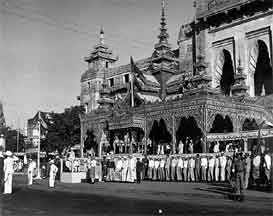1932 Coup D'Etat Ends Monarchy in Siam
The army staged a coup d'état that ended the absolute powers of the monarchy. The coup was staged by young army officers educated abroad. They held the King captive for a short period until he agreed to a new constitution. Under this new constitution, a national assembly was created– half-appointed and half-elected– under universal suffrage.
Siam experienced a period of modernization under King Chulalongkorn (Rama V), who ruled from 1868 to 1910. He implemented numerous reforms, such as abolishing slavery, establishing a modern education system, and developing infrastructure. However, the country still faced several challenges, including economic hardships and political instability.
The Coup: A group of military officers and civilian bureaucrats, known as the "Promoters" or the "People's Party," led the coup. They were motivated by their desire to modernize Siam further, reduce the power of the monarchy, and establish a democratic government. Many of these individuals were educated abroad, particularly in Europe, and were influenced by the democratic ideas and political philosophies they encountered there.
On June 24, 1932, the Promoters seized control of key government institutions in Bangkok, the capital city, while King Prajadhipok (Rama VII) was away from the palace. They issued a manifesto declaring their intentions and demanding that the king accept a constitution limiting his powers.
Aftermath: Initially, King Prajadhipok agreed to the demands, and the coup was relatively bloodless. A temporary constitution was drafted, and a permanent one was put into effect in December 1932. Thus, Siam transitioned from an absolute monarchy to a constitutional one, with the king's role significantly reduced, and the government mainly controlled by the military and civilian bureaucrats.
The new government faced a number of challenges, including political instability, economic hardships, and regional tensions. The country went through a series of political changes, military coups, and even brief returns to absolute monarchy. However, the foundation for a modern, constitutional Thailand was laid during this period.
In 1939, the country's name was officially changed from Siam to Thailand. Despite its turbulent political history, Thailand remains the only Southeast Asian nation that was never colonized by a European power, and the 1932 coup d'etat is considered a crucial turning point in its modern history.
 >
>